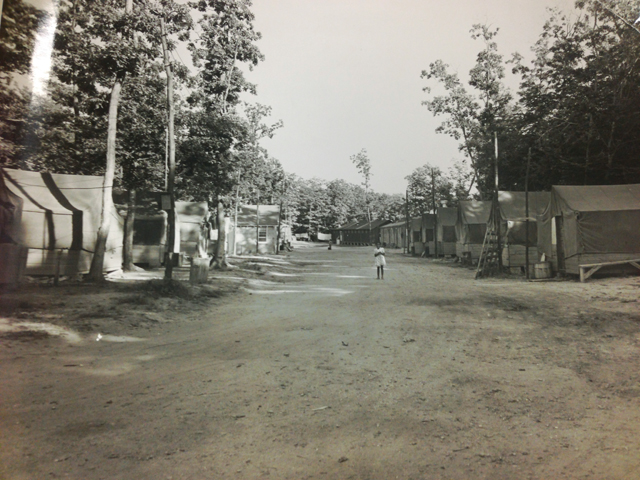Column: The wheel of history keeps turning

About a decade ago, I spent months talking to the men and women who lived in a farm labor camp that sat by the railroad tracks on Depot Lane in Cutchogue. There were once dozens of these labor camps at railroad crossings, in Riverhead, Mattituck, Cutchogue and Southold. When I began visiting this one, it was the very last of its kind.
I had seen a tall, painfully thin man riding his bike up Depot Lane one summer day and, curious, I followed him up the lane, over the tracks and around the huge barn that stood by the road. I began regularly visiting the camp building behind the barn, where a group of about a half-dozen men and women lived.
They were all southern born and black and had come north to work on eastern Long Island potato and cauliflower farms. They spent their days in the big barn putting potatoes in bags brought to them by just three potato farmers left in the area. They were mostly a sad lot — long separated from their families and unable to escape the lives they were living. They were poor, modern-day sharecroppers in a land of plenty.
And they were a lost people, unconnected to the larger community of the North Fork, in many cases oblivious to their own pasts and hometowns. Some had no birth certificates or even an idea what year they were born. They lived out their lives in a camp that, hidden behind the big barn, went unnoticed by most residents. Some of the camp residents knew where they were from and the names of family members they had not seen in decades; others knew nothing at all. Their bios were slim: They’d picked tomatoes in Florida and eastern Virginia, cotton in South Carolina and potatoes in Delaware, New Jersey and Long Island.
They were the residents of the very last farm labor camp of its kind on eastern Long Island. The camp was only a mile and a half from my house, and I went down that road hundreds of times and did not know it was there. They represented a time that had long ago vanished, when thousands of acres were planted in potatoes. I saw them as refugees, symbols of a vanished past, and soon they were telling me their stories, which I wrote as a reporter for Newsday.
Several of the residents died during the time I was talking to everyone. One, a soft-spoken woman named Bea Shaw, who always seemed to me to have some hidden-away story she could not bring herself to tell, was murdered in Riverhead by a man looking for drugs. Later, the big barn where they worked burned to the ground. The camp where they slept was shuttered. Their history in Cutchogue ended. Now they were homeless.
I bought one of the men a Greyhound ticket to Georgia. Because he had no form of identification — no scrap of paper with his name on it — I drove another man, Frank Singleton, to his family’s home in McClellanville, S.C., where he learned his name was actually Frank Snyder. Frank’s mother was waiting for him when we pulled up in front of the house. She had not seen him since the early 1960s. She wept and shouted, “My son is home! My son is home!” as we walked up to the house. As Frank greeted his mother, the congregants of a nearby church emptied out to greet him as if they were witnessing a great miracle, which it was.
I flew another man home to Savannah, Ga. His name was Oliver Burke. Everyone called him June, for Junior. His mother was waiting for us at the door where she lived. Soon after her son was born, some 60 years before his return on this momentous day, she had given him up to a cousin going north to New Jersey to pick blueberries. She knew she could not raise, house or feed him. She hoped for the best and kissed her newborn son goodbye, certain she would never see him again. I can still hear her cries as we got out of the car and she walked up to hug her son, in complete disbelief that he was really standing there in front of her.
These men and women were Cutchogue, too. They represented a past replaced by trendy wineries and roadside agri-entertainment businesses where people buy roasted corn and pose for a photograph by a tractor on a “rural” farm. I wrote about them because their stories were about here — the here that was gone. And because their stories were worth telling, their names and lives worth remembering. I wanted history to record they were here.
I recently drove into the Catholic cemetery on Depot Lane to look for the gravestone of a woman named Ellen Holland. She was a house servant to James and Frances Wickham in the early 1850s. She was in the house, asleep, on a night in 1854 when a recently fired farmhand named Nick Behan broke into the house and took an axe to the Wickhams, killing them both. News accounts of the horrific murders noted that a relative of James Wickham, John Wickham, who was born in Cutchogue, was Aaron Burr’s lawyer when the former vice president — and killer of Alexander Hamilton — was tried for and acquitted of treason in 1807.
Ellen, who had immigrated to the United States along with millions of other Irish men and women during the famine, later married an Irish immigrant who had a farm on the eastern end of Oregon Road in Cutchogue. She began a new life and likely had a hand in the new “Irish” Catholic church, Sacred Heart, that was built in Cutchogue in the 1870s — a church with beautiful stained-glass windows and a story to tell, which is now shuttered and for sale.
Standing by her gravestone one afternoon, I wondered how she could have moved on from something so horrific. Did she stay in touch with members of the Wickham family? After all, she was an immigrant, Irish and Catholic. They were old Cutchogue, English and Protestant.
The first Wickham, Joseph, arrived in Cutchogue from Bridgehampton in 1699. Several generations of the Wickham family lived in the old house that now sits on the Cutchogue Village Green. A grandson of Joseph, Parker Wickham, lost all of his holdings at the end of the Revolution — hundreds of acres in Cutchogue, Robins Island and in Riverhead — as punishment by New York State for supporting the British.
After the killings, James’ brother William Wickham moved into the Cutchogue house that sits at the top of Wickham Creek. The house is still there, largely unchanged from those days. William was the Suffolk County district attorney. Behan was hanged for his crime in what is now a parking lot in Riverhead. William later died of blood poisoning and the farm was taken over by his son, James, who also died of blood poisoning after digging a thorn out of his hand with a pocket knife. His son Parker took over. After he died on Main Road in Cutchogue April 5, 1930, in a car wreck while responding to a fire, his brother John — who was driving the car that fateful day — took over that handsome farm, which remains in the family today.
John Wickham was larger than life to me, a true Renaissance man. He was Jeffersonian in so many respects. He was devoted to his family’s North Fork history, dating back three centuries, and to the land he always said he was privileged to farm. My talks with him turned into a book, “Heaven and Earth: The Last Farmers of the North Fork.” In it, I told the stories of the Wickhams, the McBrides, the Tuthills, the black farmworkers and the Indians who lived on the North Fork for 10,000 years before being pushed out of the way by the English.
I write all of this because the North Fork is a place of remarkable people and remarkable stories. There are many more to be told. A final thought: The last resident of the old farm labor camp was an elderly man named Jimmy Wilson. To me, he too was larger than life, a true survivor. After the barn burned down, I told him I would drive him to the tiny hamlet of Barwick, Ga., where he was born in 1918, to live out his life. He refused to go, vowing he would never set foot in Georgia again. In reading news accounts of life in that part of southern Georgia after Mr. Wilson was born, it was easy to see why he refused to return.
When I told him I would go without him, he had one request: Would I please look for the grave of his mother, Ada Wilson, who died in 1925? I told him I would.
“If you find it, could you put flowers on her grave for me?” he asked.
I went and found the grave in an unmarked field behind a tiny rural church. The church held a service while I was there to honor a man born in Barwick and his request that his mother be remembered more than three-quarters of a century after her death.
Then the congregation emptied out and we all walked to that field. People sang; some prayed. A warm sun shone above us. None of the graves were marked. But I knew from a longtime Barwick resident where in the field Ada Wilson had been buried.
As we put flowers on the grave of a mother Mr. Wilson had lost when he was 6 years old but had never forgotten, I thought about his leaving this place and ending up in a farm labor camp by the railroad tracks in Cutchogue — and about how the wheel of history never stops turning.
Top photo credit: 1947 photo of the Cutchogue labor camp courtesy of the Southold Historical Society
 The author is the executive editor of Times Review Media Group. He can be reached at [email protected]
The author is the executive editor of Times Review Media Group. He can be reached at [email protected]









